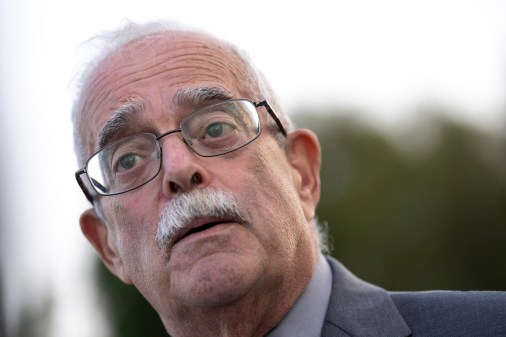Majority of agencies get D or lower on first FITARA report card

The full first report card from the House Oversight and Government Reform Committee.
The first scorecards dedicated to holding agencies accountable for meeting the savings and other benchmarks set by last year’s Federal IT Acquisition Reform Act are out — and they’re bad.
Of the 24 agencies whose purchasing of IT equipment and services FITARA covers, a majority earned a D grade or lower overall, with the Education Department, Energy Department, and National Aeronautics and Space Administration earning an F. No agency earned an A overall, and only two got B’s — the Department of Commerce and the General Services Administration.
Despite the rough marks, members of the House Oversight and Government Reform Committee were more supportive than scornful during a hearing on Capitol Hill Wednesday, which examined how the White House’s Office of Management and Budget and several agencies are working to implement FITARA baselines.
The overall grade on the report card was derived from scores for four objectives set by FITARA:
- Data Center Consolidation
- IT Portfolio Review Savings
- Incremental Development
- Risk Assessment Transparency
For every category except risk assessment, either half or a majority of agencies earned an F. Only three agencies earned more than one A in any category: The Nuclear Regulatory Commission, the Environmental Protection Agency and Commerce Department.
“We understand that this is the first interim report card, it’s not the be all, end all,” said Rep. Gerry Connolly, D-Va., the ranking member of Oversight’s Government Operations subcommittee at the hearing. “The intent isn’t to punish or stigmatize. It is to exhort and urge agencies to seize opportunities and use the report card to better guide decision making.”
Chief Information Officers from the Treasury Department, Transportation Department and General Services Administration, along with Federal CIO Tony Scott, were also all complimentary of what FITARA is trying to achieve, despite a number of the agency’s represented by witnesses receiving some of the worst grades.

Federal CIO Tony Scott, Treasury CIO Sonny Bhagowalia, Transportation CIO Richard McKinney, GSA CIO David Shive, and GAO Director of IT management issues David Powner
“I am so grateful to this committee for FITARA,” said Transportation Department CIO Richard McKinney, whose agency received a D. “I sense your urgency. I have that same sense. I think this is our last chance to get it right.”
“FITARA presents a historic opportunity to reform the management of information technology across the federal government,” said Scott. “It’s important that we do not underestimate the work and the commitment required by agencies and the broader ecosystem to fully implement this law and the changes it represents in culture governance, IT processes, business processes, and quite frankly the way we do oversight. Simply replaying pages from the old playbook is the not the solution.”
The section in which agencies received the worst marks was in data center consolidation, with 15 of 24 agencies receiving an F. David Powner, director of information technology management issues at the Government Accountability Office, said during the hearing that the number of data centers reported by federal agencies has actually grown to 11,700, with only 275 being considered “core,” or primary to agency use.
“I really think a good hard look needs to occur with those core data centers,” Powner said. “Is that the right number? And the ones that are not core, what are we really doing with them? How many of those are going to be remaining?”
Even with agencies getting poor grades, Powner expressed optimism about some agencies improving due to the high goals they have set in accordance with the FITARA baseline.
“Treasury and Transportation got Fs but we feel better about their Fs because they have high goals,” Powner said when asked about data center consolidation. “But some agencies that have As and Bs with low goals, and have actually achieved more than their goals, we don’t feel so good about those.”
Auditors from Powner’s office at the GAO prepared the scorecard for the committee.
They calculated the first two grades based on the dollar savings agencies were supposed to achieve based on data center consolidation and a review of their entire IT portfolio. The grade for incremental development was tabulated by measuring how many IT projects tied to major investments were delivered every six months. The risk assessment grade was based on how agencies gauged the risk of their major IT projects.
IT subcommittee chairman Rep. Will Hurd challenged McKinney as to why only nine of the 59 major IT projects at the Transportation Department had delivered anything in six months increments, which was a measurement tied to the scorecard’s incremental development grade.
McKinney replied that a number of those projects were tied up within the Federal Aviation Administration, which can only talk in terms of years to deliver projects because of the sensitive work involved in upgrading the technology that keeps the national airspace safe.
“When talking in terms of years versus months, that’s one of the things that’s been concerning to us,” Hurd replied. “I recognize the difficulty of the task, but the American people are tired of hearing it takes two years to do something that would take any other entity less amount of time.”
Even with the disagreement on deliverable timelines, Hurd said FITARA is meant to give CIOs the authority needed to improve things like project speeds and acquisition reform. But before adjourning, he also mentioned that accountability will go hand-in-hand with that authority.
“If we are not seeing movement, these conversations are going to grow a little more uncomfortable,” he said.
To contact the reporter on the this story, email him at Greg.Otto@FedScoop.com or follow him on Twitter at @gregotto




